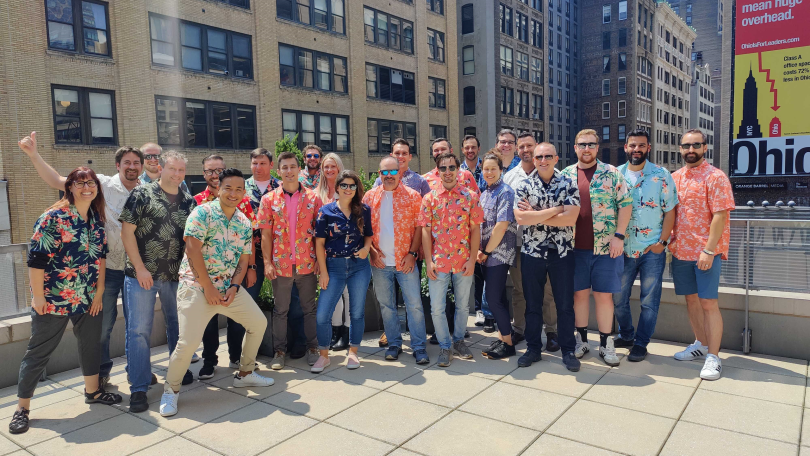International Women’s Day is on the horizon, and as we celebrate achievements in the advancement of women’s rights around the world, we can also pause for a moment to consider how we got here and where we’re going.
Glass ceilings aren’t shattered in one fell swoop. Instead, they’re chipped and cracked until they finally give out.
Advancements in representation, access to opportunity and true equality cannot be credited to any single person or coalition. On the contrary, generations of women worldwide have played a role in upending the status quo and removing the barriers that have stood in the way of progress.
In the tech industry, talented women have broken into a male-dominated space, each contributing to an environment where anyone can succeed — regardless of their gender or identity. But there is still a long way to go before the gap between women and men is closed. Women hold between 15 to 25 percent of leadership positions, depending on the data source.
For women in leadership roles, the knowledge and advice amassed throughout their career journeys can prime the next generation of women in tech to chart their course and fully realize their potential. Built In NYC spoke to six such leaders to learn more about the lessons they’ve learned over time and the advice they have for those who follow in their footsteps.
Maven Clinic provides on-demand access to care in fertility, parenting and pregnancy.
What’s the most important lesson you learned as you grew your career? Was it through a piece of advice, an experience, or something else?
The most important lesson I’ve learned is how to ask really good questions and keep digging — even if uncomfortable — until I “get it.” This has helped me learn faster and contribute, but more importantly, it’s helped me understand people better and build strong relationships.
I first learned this on a consulting project where market research was required, and I was in charge of conducting dozens of interviews with former engineers about a very specific type of industrial goods. After the first handful of interviews, my manager asked me what my key takeaways were, and I had none, despite my thorough interview guide and endless pages of notes.
My manager then offered to lead an interview and showed me what good looks like. He was willing to ask the “dumb questions” that I had avoided; he’d keep digging until he got to the why behind what they said, ultimately putting together the real story.
This lesson has helped me immensely in different roles at Maven, from my first role in creating operational processes to address pain points for our care team, to my more recent position in building trusting relationships and developing business with external partners.
How do you stay motivated and inspired as a leader, and how do you try to motivate and inspire other women at your company?
I feel very lucky to work at a company where our mission genuinely motivates me. We’re driven to improve the health of women and families who have been historically underserved by status-quo healthcare. We show up for people with compassionate support in some of their most vulnerable and joyful life stages — from the postpartum mom to the couple pursuing adoption to the woman thriving in her career while going through menopause.
Two things that personally keep me going are hearing our members’ stories, which we highlight in every all-company meeting, as well as hearing our team members and executives share their own. Kate Ryder, our founder and CEO, has shared her story of raising three kids with her husband while leading Maven, and Will Porteous, our chief growth officer, has shared his experience where he and his husband became new dads through surrogacy.
I think it’s important that executives — and all leaders — share this level of vulnerability with their teams, as it really builds a trusting environment and helps everyone feel more connected.
What advice do you have for the next generation of women in tech, and why is this advice important?
It’s important to seize the opportunity in front of you rather than worrying about what steps you think you need to take to “climb to the top” or achieve the next level. While having a career plan can be helpful, over-planning can sometimes lead to “just trying to get there” and missing the moments where you can make a big impact.
Instead, I think it’s helpful to double down on what you’re uniquely good at and work for people that you can learn from and then trust that good things will come from it. This may mean taking an interesting lateral move instead of pushing for a promotion or staying on a project longer than you expected because you’ve become a real expert in it.
I think it’s helpful to double-down on what you’re uniquely good at and work for people that you can learn from, and then trust that good things will come from it.”
As long as the work is challenging, you’ve figured out what you can uniquely own and the leader is motivating, it’s going to move you forward and help you grow in some way.
Spring Health is on a mission to increase access to mental health solutions. The healthtech company uses AI to connect health insurers and employees to optimal care solutions.
What’s the most important lesson you learned as you grew your career?
The most important lesson I have learned throughout my career is to take risks and say yes to new opportunities. That’s something people say often, but it takes repeated experiences and exposure to understand just how powerful that advice can be.
Throughout my career, I have been asked to take on roles and responsibilities that I had never tackled before, like diversity, equity and inclusion, total rewards and even functions outside of HR, such as customer operations. At the time, those new responsibilities felt like quite a stretch for me, and yet they taught me the most — not only technically, but those experiences helped me develop to become a more adaptable leader and fueled my professional and personal growth. Whenever I said yes to the scary and unknown, those moments uniformly became important career-accelerating moments.
Importantly, those role expansions did not consistently come with more pay or a bigger title right away. And that was okay — I wanted to earn it first with proven results. Ultimately, the rewards came, and that taught me that if you deliver with passion, purpose and a focus on the greater good, then rewards and growth will consistently follow.
How do you stay motivated and inspired as a leader, and how do you try to motivate and inspire other women at your company?
I have experienced a range of industries in my career, from manufacturing to financial services and health tech. No matter the setting, I have found that the two most important drivers of motivation and inspiration for me are believing in the mission and getting to take on a messy challenge that will lead to transformational outcomes. When both of those conditions are in place for me, I find that I am committed and relentless in the pursuit of my goals.
In terms of inspiring other women, there is a balance between raising the bar for excellence and also recognizing and having the compassion to know that biases exist. In fact, there is research that shows that men are more likely to go for a promotion whether they have the experience or not, and women believe they must check every box. I see my role as helping high-potential women understand that it is not about checking every box and instead demonstrating their capability to do something even if they are not yet fully proven. In other words, I work to help high-potential women demonstrate all of their potential.
What advice do you have for the next generation of women in tech, and why is this advice important?
My advice for the next generation of women in tech is this: You must challenge the status quo. Unfortunately, there are still many biases to overcome when it comes to senior women in leadership. Women in tech face many difficulties, but know you are also capable of incredible things.
You must challenge the status quo. Women in tech face many difficulties, but know you are also capable of incredible things.”
Don’t be afraid to put yourself out there and take on new roles and responsibilities. Don’t be afraid to ask for help, both from your peers and from experienced professionals. Believe in yourself, build meaningful relationships and take advantage of the resources available to you.
Finally, make sure to take care of your physical and mental health. You have to put your oxygen mask on first. It’s so essential to stay sharp, focused and energized throughout your career journey so that you can unlock your full potential.
Redesign Health develops technologies, tools and insights that drive innovation in the healthcare industry.
What’s the most important lesson you learned as you grew your career?
Professional and personal growth are inextricably linked. I didn’t fully appreciate this connection until a little over a decade ago when I was contemplating the first pivot in my career from the bedside as a social worker into an operations and business development or strategy role.
I had a great opportunity in front of me, one that I was truly excited about, though I found myself questioning whether I was ready. Could I still make an impact? Would my skills and experience translate? Contemplating those questions, I realized that the only thing holding me back was me. I decided that I could have some fear and doubts and do it anyway.
Taking a risk isn’t easy — though nothing worthwhile ever is — and it wasn’t. I had a lot to learn, but I also had a unique perspective. If I hadn’t taken that step, it’s hard to imagine I’d be where I am today. Embracing the opportunity to leverage my strengths while continuously learning was my most important lesson and one that I continue to apply to my life, in and out of the office.
How do you stay motivated and inspired as a leader, and how do you try to motivate and inspire other women at your company?
Being a leader is a privilege and a tremendous responsibility that I do not take lightly. To lead is a verb, and verbs are action words — I’m big on the meaning of words.
There are two definitions of lead: to cause a person to go with one by holding them by the hand while moving forward, and to be a route or means of access to a particular place or in a particular direction. Moving forward is important, but I like to think that as a leader, I can be a route and means of access, especially for other women. I am grateful every day to be in a position to empower and support, inspire and identify opportunities where others can expand their horizons.
At Redesign Health, we have a number of affinity groups, one of which is for women. It’s a joy to participate in something that intentionally brings together women across all teams, in different roles and at various stages of their careers. Building a community with women is powerful, and I hope that all women find ways to do that, particularly in their professional lives.
What advice do you have for the next generation of women in tech, and why is this advice important?
Know yourself, really know yourself. What are your strengths, your opportunities for development and what is your North Star? Let the answers to those questions guide you as you take on new projects and evaluate opportunities.
Know yourself, really know yourself – what are your strengths, your opportunities for development and what is your North Star?”
If someone told me 20 years ago I would be doing what I’m doing today, I don’t think I would have believed it, and that’s the excitement and joy of the process. Trust yourself and your journey. See where it takes you and be open to what is possible. Acknowledge your fears, but don’t let them limit you. If you’re looking for a sign, here it is and know that I’m cheering you on!

Jackpocket, one of Built In’s Best Places to Work in 2023, is the first licensed third-party lottery app in the country.
What’s the most important lesson you learned as you grew your career? Was it through a piece of advice, an experience or something else?
What I’ve learned over the years is to keep things in perspective. Your career isn’t going to be built after landing the “perfect job,” or conversely, ruined from one misstep. My career has not been linear or without its challenges, but I’ve learned from every opportunity, and each role provided me a stepping stone to where I am today.
I started in management consulting right out of undergrad, which provided a fantastic foundation and exposure to different industries and companies, but I knew it wasn’t going to be where I would stay long-term. I had always wanted to live in NYC, so I decided to pursue my MBA at NYU Stern to broaden my skill set and focus more on marketing. After graduating, I first worked in brand management until I had the opportunity to join American Express’s startup arm. That was a critical point in my career when I realized I enjoyed working in smaller organizations where I could make more of an impact. I took the plunge into startups and haven’t looked back!
How do you stay motivated and inspired as a leader, and how do you try to motivate and inspire other women at your company?
Setting boundaries is incredibly important, especially as a new mom, and I try to lead by example. Working from home during the pandemic was extremely productive, but the lines between work and home got blurred, and I was very close to burnout. We’ve recently started hybrid return-to-office two days per week, so I’ve tried to use this time to reset and be more mindful about setting guardrails about when and how I work. Another upside of going back to the office is getting to develop those in-person interactions and relationships that can’t necessarily be fostered over Zoom and Slack. Practicing empathy and getting to know colleagues on a human level is another way I stay motivated.
What advice do you have for the next generation of women in tech, and why is this advice important?
Keep up to date on new trends and what’s going on in the industries you’re interested in. Reach out and set up informational or coffee chats with folks working at companies or roles you’re interested in. You may be surprised to see how open people are to chatting! Use those opportunities to forge connections even if there aren’t any roles available at that moment. Building genuine connections will help you in the future, but don’t treat them purely as transactional.
Building genuine connections will help you in the future, but don’t treat them purely as transactional.”
Earlier on in your career, try to determine how you will differentiate yourself from the pack and be open to learning new skills, especially those that can add immediate value to an organization — even if they may not be the most glamorous or high profile. Prioritize joining a growing company with solid team culture and business fundamentals over a specific role or vertical, and don’t get caught up in chasing titles. In an ideal situation, you’ll work on things that interest you, you’re good at and add value to the organization. Companies are teams, not families, and operate best when working together on a common purpose built on trust and respect.

Augury is a machine health solutions company that provides health diagnostics that eliminate downtime and improve productivity.
What’s the most important lesson you learned as you grew your career?
I have learned many important lessons throughout my career, especially about being a great leader. I’m lucky enough to have had leaders who I saw as role models, but I also had experiences with leaders that I do not want to replicate for my team. If I had to choose just one lesson that stuck with me, it would be to always empower my team.
I once had a manager who could be given any task and she would excel. She also happened to be the founder of one of the companies I have worked for, and this originally made me feel like I had to be the absolute best at everything I did in order to be successful. While I still strive to be the best that I can be, I now put more importance on building up the people around me. I learned while working under her that she was very good at surrounding herself with other brilliant people. In the end, this made her company even more successful. When I build my team, I look for candidates that will complement and grow our overall skills that are already there.
This method allows me to still find motivation from my leaders and strive to be a better leader myself, but also be inspired by my direct reports.
While I still strive to be the best that I can be, I now put more importance on building up the people around me.”
How do you stay motivated and inspired as a leader, and how do you try to motivate and inspire other women at your company?
My colleagues! I have been very picky about working for companies with values that align with my own, along with cultures that drive high performance and growth. Surrounding myself with brilliant and motivated people creates an environment where inspiration is contagious, and it is now a requirement for me. I have been fortunate enough to always work for companies that recognize the challenges that women can face in the corporate world.
My current company, Augury, does a phenomenal job at always putting people first — a huge reason why I came to work for them. As a leader, it feels amazing to be able to tell the women on my team that the entire company supports them and their growth. Being in manufacturing, a traditionally male-forward industry, all the women in my team can confidently work while knowing their company fully supports them. Not only do I hold myself accountable to make sure my female colleagues feel confident and comfortable in this field, but I remind my team that this mentality comes from the top at Augury and throughout the leadership.
What advice do you have for the next generation of women in tech, and why is this advice important?
Never settle. I truly believe that what got me to where I am and on the path of where I want to go is never viewing my gender as a potential roadblock. While it is good to be aware of the challenges that a woman can face, people are entitled to their roles based on their qualifications, not their gender. I’ve moved up quickly in my career by going above the demand of current job expectations. Performance and work ethic will shine the brightest, so my advice is to focus your energy on exceeding your company’s goals and mission.
Work & Co is a design and technology company that defines and launches digital products.
What’s the most important lesson you learned as you grew your career?
Very early in my career, I learned the importance of putting my best foot forward — doing my best work, all while building good working relationships. Though it’s often essential for us to work autonomously on a particular task or exercise, it’s also important to recognize how the best work can be informed through input and help and how interaction with others can enhance your professional career. No matter how small the exchange is, it can leave a long-lasting impact.
While working for my previous employer, I worked alongside a talented designer who was passionate about their work. As a young and relatively new quality assurance analyst, I wanted to ensure that their dedication translated to our customers through the quality of the work we produced. As a result, we collaborated a few times on project work, hoping to bridge a gap between design and development. They later left the company and went on to work at a new agency — Work & Co.
When the agency began looking for its first QA person, I was their first thought. I certainly couldn’t have imagined that our short-lived working sessions would change my career trajectory. Those you work with now can be your future business partners, investors, supervisor and so on.
How do you stay motivated and inspired as a leader, and how do you try to motivate and inspire other women at your company?
As a leader, my greatest motivation is the people around me. Working on a team — and leading one — inspires me to stay positive, work hard, lead by example and move forward. My responsibility as a leader is to make sure I’m providing what they need to succeed and that they feel empowered to make decisions and meet their goals. Knowing they have the ability and capacity to progress in their careers, it’s my duty to support their long-term growth. The idea that I might provide a solution to a problem, unlock new opportunities or help start a new learning journey is gratifying.
I try to motivate the women around me by prioritizing and promoting individual improvement. At any scale, continued education helps to enhance personal and professional development. It provides more references when making career decisions. I encourage people to block at least an hour twice weekly on their calendar to focus on learning and nurturing new skills. It’s also important to me to recognize individual capabilities and skill sets. No two individuals are exactly alike; thus, it’s vital to provide opportunities that will cater to, help uplift or challenge the specific person allowing for personal growth.
What advice do you have for the next generation of women in tech, and why is this advice important?
Deviate from your comfort zone. Do not shy away from opportunities that may scare you. Instead, be thoughtful and consider them carefully. Consider how the opportunity can help you continue your personal growth, increase confidence, be more creative and meet new people. By turning down opportunities presented to you, you run the risk of minimizing your progress and development. Know that when you’re nervous and scared, you aren’t the only one. Many of us face the same anxieties. By opening yourself up to new experiences, you learn new lessons, become more resilient and may even discover something new that you love and enjoy. Take small, incremental steps and keep an open mind.
By opening yourself up to new experiences, you learn new lessons, become more resilient and may even discover something new that you love and enjoy.”
Seek mentors and sponsors. Within your organization, look to find both a mentor and a sponsor. A mentor can help you navigate the company and provide career advice, direction, feedback and support. While a mentor has the knowledge and will share it with you, a sponsor has power and will use it for you. More broadly, a sponsor can advocate for valuable career opportunities, make visible the work that you are doing and intervene if biased assessments are being made. None of us can achieve our visions and aspirations on our own. We all need help along the way.

















